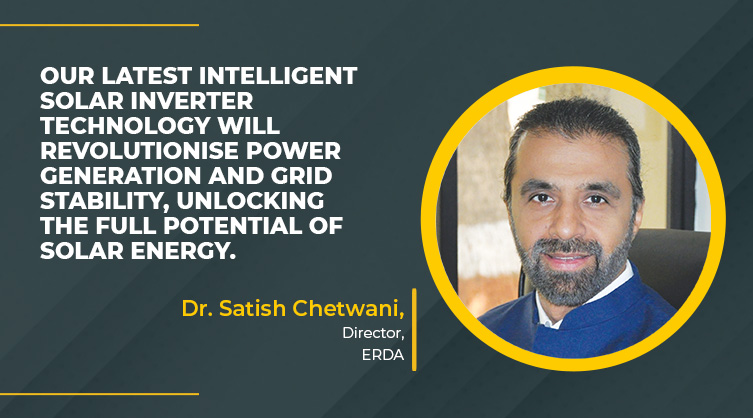ERDA fuels the future with novel battery technologies and energy independence
By EPR Magazine Editorial May 25, 2023 9:07 pm IST
By EPR Magazine Editorial May 25, 2023 9:07 pm IST

During an interview with EPR Magazine, Dr. Satish Chetwani, Director of Electrical Research and Development Association (ERDA), explains that the large-scale integration of renewable energy into the grid requires the development of energy storage technologies capable of bridging the gap between production and demand.
Can you provide more details about ERDA’s Advanced Cell Chemistry research programme for energy storage?
ERDA is developing Advanced Cell Chemistry (ACC) batteries such as sodium-ion (Na-ion) and reversible aluminium-ion (Al-ion) battery technologies. These new battery technologies can use raw materials abundantly available in India to reduce our import dependence. Al-ion batteries offer improved safety and ease of recycling, making them environmentally sustainable. For the indigenous development of ACC batteries, ERDA has established full-scale coin cell fabrication and analysis facilities.
How does ERDA ensure the accuracy of its testing facilities?
ERDA always believes in delivering accurate test results to the customer. ERDA uses the latest and highestaccuracy class of measuring equipment traceable to national or international standards. All laboratory equipment is maintained up-to-date per the relevant standard’s requirements. Environmental conditions in the laboratories are maintained as per requirements. Personnel involved in testing are trained and competent in their respective areas.
What challenges do you see in integrating renewable energy systems with the existing grid infrastructure, and how is ERDA addressing these challenges?
Three main challenges arise when integrating renewable energy into existing systems. The first challenge is the intermittent energy supply, often called the Duck Curve, in the context of solar energy production. This refers to the disparity between energy production and consumption throughout the day. Solar production is high during daylight hours while demand is relatively low, and the opposite occurs at night. This fluctuation poses a significant challenge for utility companies. To address this, large-scale integration of renewable energy into the grid necessitates the development of energy storage technologies that can bridge the gap between production and demand.
The second challenge revolves around the distance between renewable energy production sites, such as solar parks, wind parks, and future offshore wind parks, and the centres of energy consumption. These renewable energy facilities are often located far away from urban areas, requiring energy transportation over long distances with minimal energy loss. This necessitates identifying and implementing suitable long-distance transmission line technologies, whether alternating current (AC) or high-voltage direct current (HVDC) systems.
The third challenge concerns the increased penetration of renewable energy sources and the widespread distribution of energy-generating systems. While this is a positive development for sustainability, it can also impact grid stability. Implementing digital substations and power electronics with flexible direct current (DC) grids becomes crucial to address this.

Furthermore, integrating renewable energy systems with the existing grid requires using intermediate power electronics devices, such as solar inverters. Solar inverters convert the direct current (DC) output generated by solar photovoltaic panels into alternating current (AC) for grid compatibility. However, using solar inverters introduces harmonics in the power supply, which must be carefully managed. In compliance with regulations set by the Central Electricity Authority (CEA), renewable energy developers are required to submit detailed reports to utilities and local distribution companies (LDCs). These reports provide information on the harmonics and other relevant parameters, and the Power System section of the Electrical Research and Development Association (ERDA) conducts comprehensive measurements based on CEA guidelines. The resulting report is then provided to customers for further submission to utilities and LDCs, ensuring quality and regulatory standards adherence.
What are some of the most exciting new technologies and applications you are currently working on in power electronics and renewable energy?
ERDA’s R&D centre has developed technology for a smart grid-tied solar inverter. This inverter is smarter because it can provide reactive power compensation and active power generation. It can communicate with the electrical grid, improving the solar inverter’s power factor and capacity utilisation. The main features of this developed technology are as follows:
• Reactive power compensation feature in a grid-tied solar inverter.
• Available modes for VAR compensation:
• Fixed Q mode
• Fixed PF mode
• Volt-VAR mode
• DSP-based digital design
• MPPT tracking with tracking efficiency greater than 99 percent
• Reliable grid synchronisation.
• A built-in output isolation transformer.
Can you explain the significance of the NABL accreditation for your laboratories?
Nowadays, NABL accreditation is a mandatory requirement for testing laboratories. NABL accreditation significantly helps improve laboratory operations and leads to higher customer confidence in ERDA’s test reports, thereby achieving higher customer satisfaction. ERDA facilities have been NABL accredited since 1998, and all newly established facilities have been occasionally included in the accredited scope. NABL accredits ERDA’s test and calibration facilities for their permanent, on-site, and mobile facilities.
How does ERDA ensure its testing facilities remain current with industry standards and regulations?
Since the inception of ERDA, customers have been offered world-class testing facilities and services. ERDA follows national (IS) and international (IEC/ ISO/ASTM, etc.) standards for testing. ERDA is also actively involved in the standardisation process for national standards. ERDA officials are members of their respective BIS technical committees and participate in formulating and updating standards based on the latest trends and requirements.
We use cookies to personalize your experience. By continuing to visit this website you agree to our Terms & Conditions, Privacy Policy and Cookie Policy.